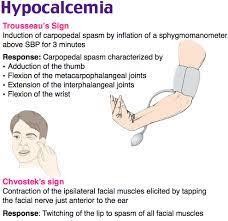A 25-year-old female presents with amenorrhea and hirsutism and is diagnosed with polycystic ovary syndrome (PCOS). Lab testing will most likely reveal:
genetic cancerous mutations.
hyperinsulinemia
cortisol excess.
estrogen deficit.
The Correct Answer is B
Choice A rationale: PCOS is not typically associated with genetic cancerous mutations.
Choice B rationale: Insulin resistance and hyperinsulinemia are commonly associated with PCOS, contributing to its pathophysiology.
Choice C rationale: While cortisol abnormalities can cause similar symptoms, it's not a primary finding in PCOS.
Choice D rationale: PCOS often involves hormonal imbalances, but it's not characterized by an estrogen deficit.
Nursing Test Bank
Naxlex Comprehensive Predictor Exams
Related Questions
Correct Answer is C
Explanation
Choice A rationale: Chvostek and Trousseau signs are not typically associated with hypothyroidism.
Choice B rationale: These signs are not commonly related to pineal tumors.
Choice C rationale: Chvostek and Trousseau signs, indicating neuromuscular irritability due to hypocalcemia, are often seen in hypoparathyroidism.
Choice D rationale: Chvostek and Trousseau signs are not characteristic findings in pheochromocytoma.

Correct Answer is C
Explanation
Choice A rationale: BSE will not reduce the risk of dying from breast cancer, but it may help you detect breast cancer earlier, when it is more treatable.
Choice B rationale: BSE should be done once a month, preferably at the same time each month. For women who have menstrual periods, the best time to do BSE is a few days after the period ends, when the breasts are less tender and swollen. For women who do not have menstrual periods, such as those who are pregnant, breastfeeding, or postmenopausal, they can choose a fixed date, such as the first day of each month, to do BSE.
Choice C rationale: For women who have menstrual periods, the best time to do BSE is a few days after the period ends, when the breasts are less tender and swollen. For women who do not have menstrual periods, such as those who are pregnant, breastfeeding, or postmenopausal, they can choose a fixed date, such as the first day of each month, to do BSE.
Choice D rationale: Annual mammograms are recommended for women aged 40 and older, or earlier if they have a high risk of breast cancer and not all women. Women aged less than 30 years should undergo breast ultrasound instead.
Whether you are a student looking to ace your exams or a practicing nurse seeking to enhance your expertise , our nursing education contents will empower you with the confidence and competence to make a difference in the lives of patients and become a respected leader in the healthcare field.
Visit Naxlex, invest in your future and unlock endless possibilities with our unparalleled nursing education contents today
Report Wrong Answer on the Current Question
Do you disagree with the answer? If yes, what is your expected answer? Explain.
Kindly be descriptive with the issue you are facing.
